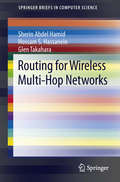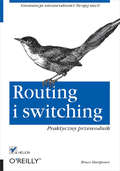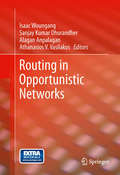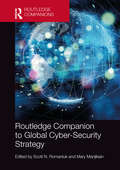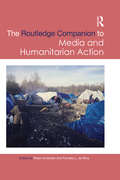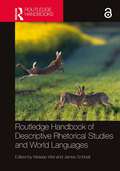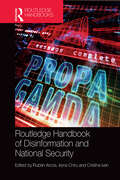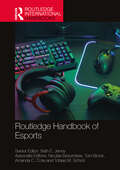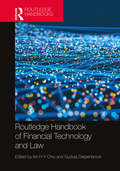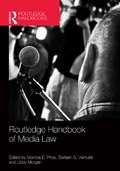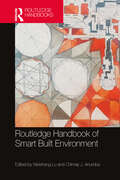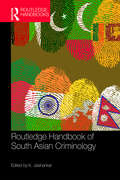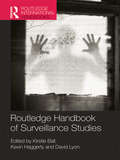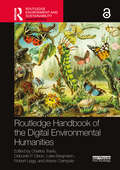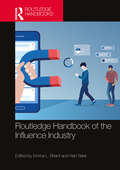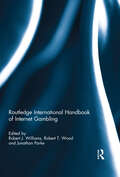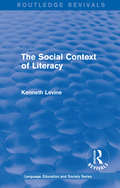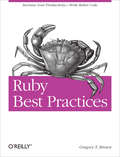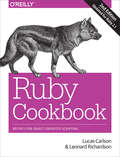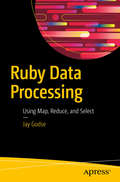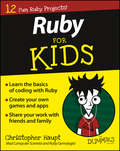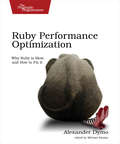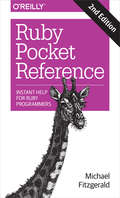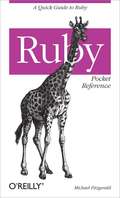- Table View
- List View
Routing for Wireless Multi-Hop Networks
by Hossam S. Hassanein Sherin Abdel Hamid Glen TakaharaThe focus of this brief is to identify what unifies and what distinguishes the routing functions in four wireless multi-hop network paradigms. The brief introduces a generic routing model that can be used as a foundation of wireless multi-hop routing protocol analysis and design. It demonstrates that such model can be adopted by any wireless multi-hop routing protocol. Also presented is a glimpse of the ideal wireless multi-hop routing protocol along with several open issues.
Routing i switching. Praktyczny przewodnik
by Bruce Hartpence"Bez zaawansowanych mechanizmów trasowania i prze??czania sie? - taka, jak? znamy - nie mia?aby szans zaistnie?. To w?a?nie te mechanizmy gwarantuj?, ?e nasze dane docieraj? w odpowiednie miejsce. Niezwykle istotne jest wi?c ich zrozumienie i wykorzystanie w praktyce. Dzi?ki temu Twoja sie? b?dzie bardziej niezawodna, a u?ytkownicy bardziej zadowoleni.W trakcie lektury tej wspania?ej ksi??ki zdob?dziesz bezcenne informacje na temat strategii trasowania i prze??czania, protoko?u drzewa rozpinaj?cego oraz sieci VLAN. Poznasz dog??bnie protokó? RIP w wersji 1 i 2 oraz protokó? OSPF. Autor na ka?dym kroku stara si? uwypukli? zagadnienia zwi?zane z bezpiecze?stwem tych rozwi?za?, a przygotowane ?wiczenia laboratoryjne pozwol? Ci jeszcze lepiej zrozumie? poruszane problemy. Je?eli Twoje codzienne zadania zwi?zane s? z sieciami komputerowymi, ten przewodnik jest Twoj? obowi?zkow? lektur? na najbli?sze dni!"
Routing in Opportunistic Networks
by Isaac Woungang Alagan Anpalagan Sanjay Kumar Dhurandher Athanasios V. VasilakosRouting in Opportunistic Networks focuses on the basics of opportunistic networks, modeling and communication in opportunistic networks, routing in opportunistic networks, and collaboration and cooperation in opportunistic networks. The editors will cover such topics as mobility characterization and discovery in opportunistic networks, scheduling and medium access control in opportunistic networks as well as testbed, tools, and measurements for opportunistic networks.
Routledge Companion to Global Cyber-Security Strategy
by Mary Manjikian Scott N. RomaniukThis companion provides the most comprehensive and up-to-date comparative overview of the cyber-security strategies and doctrines of the major states and actors in Europe, North America, South America, Africa, and Asia. The volume offers an introduction to each nation’s cyber-security strategy and policy, along with a list of resources in English that may be consulted for those wishing to go into greater depth. Each chapter is written by a leading academic or policy specialist, and contains the following sections: overview of national cyber-security strategy; concepts and definitions; exploration of cyber-security issues as they relate to international law and governance; critical examinations of cyber partners at home and abroad; legislative developments and processes; dimensions of cybercrime and cyberterrorism; implications of cyber-security policies and strategies. This book will be of much interest to students and practitioners in the fields of cyber-security, national security, strategic studies, foreign policy, and international relations.
Routledge Companion to Media and Humanitarian Action (Routledge Media and Cultural Studies Companions)
by Robin Andersen Purnaka L. De SilvaIn this moment of unprecedented humanitarian crises, the representations of global disasters are increasingly common media themes around the world. The Routledge Companion to Media and Humanitarian Action explores the interconnections between media, old and new, and the humanitarian challenges that have come to define the twenty-first century. Contributors, including media professionals and experts in humanitarian affairs, grapple with what kinds of media language, discourse, terms, and campaigns can offer enough context and background knowledge to nurture informed global citizens. Case studies of media practices, content analysis and evaluation of media coverage, and representations of humanitarian emergencies and affairs offer further insight into the ways in which strategic communications are designed and implemented in field of humanitarian action.
Routledge Handbook of Descriptive Rhetorical Studies and World Languages
by Weixiao Wei James SchnellThe Routledge Handbook of Descriptive Rhetorical Studies and World Languages offers a useful collection of papers that presents rhetorical analysis of the discoursal practice in different cultural settings. Covering issues from America to Europe and Asia, and topics from politics to media, education to science, agriculture to literature, and so on, the handbook describes how language can guide listeners’ interpretations, alter their perceptions and shape their worldviews. This book offers a solid foundation for rhetorical studies to become an essential discipline in arts and humanities, engendering innovative theory and applications in areas such as linguistics, literature, history, cultural studies, political science and sociology. This handbook will be crucial for students and researchers in areas such as literature and linguistics, communication studies, political science and arts and humanities in general. This book will also be useful to social science, education, business, law, science and engineering departments due to its coverage of rhetoric in a multidisciplinary and multilingual context.
Routledge Handbook of Disinformation and National Security
by Rubén Arcos Irena Chiru Cristina IvanThis interdisciplinary Handbook provides an in-depth analysis of the complex security phenomenon of disinformation and offers a toolkit to counter such tactics. Disinformation used to propagate false, inexact or out of context information is today a frequently used tool of political manipulation and information warfare, both online and offline. This Handbook evidences a historical thread of continuing practices and modus operandi in overt state propaganda and covert information operations. Further, it attempts to unveil current methods used by propaganda actors, the inherent vulnerabilities they exploit in the fabric of democratic societies and, last but not least, to highlight current practices in countering disinformation and building resilient audiences. The Handbook is divided into six thematic sections. The first part provides a set of theoretical approaches to hostile influencing, disinformation and covert information operations. The second part looks at disinformation and propaganda in historical perspective offering case study analysis of disinformation, and the third focuses on providing understanding of the contemporary challenges posed by disinformation and hostile influencing. The fourth part examines information and communication practices used for countering disinformation and building resilience. The fifth part analyses specific regional experiences in countering and deterring disinformation, as well as international policy responses from transnational institutions and security practitioners. Finally, the sixth part offers a practical toolkit for practitioners to counter disinformation and hostile influencing. This handbook will be of much interest to students of national security, propaganda studies, media and communications studies, intelligence studies and International Relations in general.
Routledge Handbook of Esports (Routledge International Handbooks)
by Seth E. JennyThe Routledge Handbook of Esports offers the first fully comprehensive, interdisciplinary study of esports, one of the fastest growing sectors of the contemporary sports and entertainment industries. Global in coverage, the book emphasizes the multifaceted nature of esports and explores the most pressing issues defining the competitive video gaming landscape today. Featuring the work of 93 leading esports academics and industry specialists from around the world, and rigorously peer-reviewed, the book is structured around ten key themes: 1) Introduction to Esports, 2) Esports Research, 3) Esports Players, 4) Esports Business and Management, 5) Esports Media and Communication, 6) Esports Education, 7) Critical Concerns in Esports, 8) Global Esports Cultures, 9) Esports Future Directions, and 10) Key Terms Definitions. Examining the current state of esports, emerging areas of interest and the ongoing debates shaping the esports industry, each of the 62 chapters offers key highlights, an assessment of the latest research, practical esports examples and recommendations, and is complemented by enlightening case studies or industry interviews. For further academic and professional depth, chapters also include a guide to recommended additional resources. Explaining technical terms and gaming jargon in a user-friendly manner, and maintaining a balanced tone throughout, this handbook is essential reading for any student or researcher with an interest in esports, gaming, or sport studies, and for any practitioner or policy-maker working in the esports industry.
Routledge Handbook of Financial Technology and Law (Routledge Handbooks in Law)
by Gudula Deipenbrock Iris H-Y ChiuFinancial technology is rapidly changing and shaping financial services and markets. These changes are considered making the future of finance a digital one.This Handbook analyses developments in the financial services, products and markets that are being reshaped by technologically driven changes with a view to their policy, regulatory, supervisory and other legal implications. The Handbook aims to illustrate the crucial role the law has to play in tackling the revolutionary developments in the financial sector by offering a framework of legally enforceable principles and values in which such innovations might take place without threatening the acquis of financial markets law and more generally the rule of law and basic human rights. With contributions from international leading experts, topics will include: Policy, High-level Principles, Trends and Perspectives Fintech and Lending Fintech and Payment Services Fintech, Investment and Insurance Services Fintech, Financial Inclusion and Sustainable Finance Cryptocurrencies and Cryptoassets Markets and Trading Regtech and Suptech This Handbook will be of great relevance for practitioners and students alike, and a first reference point for academics researching in the fields of banking and financial markets law.
Routledge Handbook of Media Law
by Monroe E. Price Stefaan Verhulst Libby MorganFeaturing specially commissioned chapters from experts in the field of media and communications law, this book provides an authoritative survey of media law from a comparative perspective. The handbook does not simply offer a synopsis of the state of affairs in media law jurisprudence, rather it provides a better understanding of the forces that generate media rules, norms, and standards against the background of major transformations in the way information is mediated as a result of democratization, economic development, cultural change, globalization and technological innovation. The book addresses a range of issues including: Media Law and Evolving Concepts of Democracy Network neutrality and traffic management Public Service Broadcasting in Europe Interception of Communication and Surveillance in Russia State secrets, leaks and the media A variety of rule-making institutions are considered, including administrative, and judicial entities within and outside government, but also entities such as associations and corporations that generate binding rules. The book assesses the emerging role of supranational economic and political groupings as well as non-Western models, such as China and India, where cultural attitudes toward media freedoms are often very different. Monroe E. Price is Director of the Center for Global Communication Studies at the Annenberg School for the University of Pennsylvania and Joseph and Sadie Danciger Professor of Law and Director of the Howard M. Squadron Program in Law, Media and Society at the Cardozo School of Law. Stefaan Verhulst is Chief of Research at the Markle Foundation. Previously he was the co-founder and co-director, with Professor Monroe Price, of the Programme in Comparative Media Law and Policy (PCMLP) at Oxford University, as well as senior research fellow at the Centre for Socio Legal Studies. Libby Morgan is the Associate Director of the Center for Global Communication Studies at the Annenberg School for the University of Pennsylvania.
Routledge Handbook of Smart Built Environment
by Chimay J. Anumba Weisheng LuThe primary aim of this edited volume is to document the current theories, best practices, and technological advancements in the move towards a Smart Built Environment (SBE). The needs to accelerate towards the SBE are numerous and include: Increasing complexities and the need for interconnectivity within the built environment (e.g. mega infrastructure projects) Data-driven decision-making resulting in higher demand from clients (e.g. smart design, construction, operation, and end of life [EOL]) High requirements from stakeholders (e.g. system efficiency, environmental performance, green procurement) Fast paced technological advancement and integration Natural disaster resilience of the built environment (e.g. prediction, smart control of building component) Sustainability issues around the built environment In this book, the interrelationships among the various lifecycle stages: design, construction, operation, and EOL; the collective benefit of synergy at building level, multi-infrastructure level, and city-level, as well as the ultimate goals in relation to the deployment of smart technologies in the industry are addressed. Part I covers smart design and construction, Part II smart living, and operation, and Part III broadens the scope to the whole smart city. Chapters examine: How smart technologies can improve the effectiveness, productivity, and efficiency of the built environment An overview of theories and practices that are enabled by innovations and technologies for developing the SBE The basis for new research agenda, new concepts, and frameworks for future development This handbook documents the current theories, practices, and technologies and develops a holistic approach for research and practice by adopting a multidimensional outlook for the SBE. It is an essential reference work for all built environment stakeholders, from academia through to the professions.
Routledge Handbook of South Asian Criminology
by K. JaishankarAlthough the literature and cultural practices of the South Asian region demonstrate a rich understanding of criminology, this handbook is the first to focus on crime, criminal justice, and victimization in Afghanistan, Bangladesh, Bhutan, India, Maldives, Nepal, Pakistan, and Sri Lanka. South Asia’s rapid growth in population and economy continues to introduce transformations in social behaviors, including those related to criminality and victimization. Readers of this handbook will gain a comprehensive look at criminology, criminal justice, and victimology in the South Asian region, including processes, historical perspectives, politics, policies, and victimization. This collection of chapters penned by scholars from all eight of the South Asian nations, as well as the US, UK, Australia, and Belgium, will advance the study and practice of criminology in the South Asian region and carry implications for other regions. The Routledge Handbook of South Asian Criminology provides a wealth of information on criminological issues and their effect on the countries and governments’ efforts to mitigate them. It is essential reading for students and scholars of South Asian criminology, criminal justice, and politics.
Routledge Handbook of Surveillance Studies (Routledge International Handbooks)
by David Lyon Kevin D. Haggerty Kirstie BallSurveillance is a central organizing practice. Gathering personal data and processing them in searchable databases drives administrative efficiency but also raises questions about security, governance, civil liberties and privacy. Surveillance is both globalized in cooperative schemes, such as sharing biometric data, and localized in the daily minutiae of social life. This innovative Handbook explores the empirical, theoretical and ethical issues around surveillance and its use in daily life. With a collection of over forty essays from the leading names in surveillance studies, the Handbook takes a truly multi-disciplinary approach to critically question issues of: surveillance and population control policing, intelligence and war production and consumption new media security identification regulation and resistance. The Routledge Handbook of Surveillance Studies is an international, accessible, definitive and comprehensive overview of the rapidly growing multi-disciplinary field of surveillance studies. The Handbook’s direct, authoritative style will appeal to a wide range of scholars and students in the social sciences, arts and humanities.
Routledge Handbook of the Digital Environmental Humanities (Routledge Environment and Sustainability Handbooks)
by Luke Bergmann Charles Travis Deborah P. Dixon Robert Legg Arlene CrampsieThe Routledge Handbook of the Digital Environmental Humanities explores the digital methods and tools scholars use to observe, interpret, and manage nature in several different academic fields. Employing historical, philosophical, linguistic, literary, and cultural lenses, this handbook explores how the digital environmental humanities (DEH), as an emerging field, recognises its convergence with the environmental humanities. As such, it is empirically, critically, and ethically engaged in exploring digitally mediated, visualised, and parsed framings of past, present, and future environments, landscapes, and cultures. Currently, humanities, geographical, cartographical, informatic, and computing disciplines are finding a common space in the DEH and are bringing the use of digital applications, coding, and software into league with literary and cultural studies and the visual, film, and performing arts. In doing so, the DEH facilitates transdisciplinary encounters between fields as diverse as human cognition, gaming, bioinformatics and linguistics, social media, literature and history, music, painting, philology, philosophy, and the earth and environmental sciences. This handbook will be essential reading for those interested in the use of digital tools in the study of the environment from a wide range of disciplines and for those working in the environmental humanities more generally.
Routledge Handbook of the Influence Industry
by Vian Bakir Emma L. BriantThis Handbook provides the first comprehensive examination of the influence industry and how it operates worldwide across different domains.The rapid evolution of emerging technologies and data-driven persuasive practices has been linked to the spread of misleading content in domestic and foreign influence campaigns. This has prompted worldwide public and policy discussions about disinformation and how to curb its spread. However, less attention has been paid to the increasingly data-driven commercial industry taking advantage of the opportunities these new technologies afford. The handbook uses the term ‘influence’ here to include not only messaging and public relations (PR), which fell within the traditional focus of propaganda studies, but to consider the infrastructure and actors behind an advanced array of capabilities that can be used in a coordinated way to affect an audience’s emotions, ideas and behaviors in order to advance a state or non-state actor’s objectives – increasingly based on data-driven profiling. The volume fills a gap in scholarship exploring the recent technical, political and economic development of this industry, surveying the extent of different technologies and services offered to clients worldwide across multiple domains (commercial, political, national security and government). The chapters are divided into three thematic sections and evaluate Influence Industry practices, aims and effectiveness across audiences; business practices and economics; and democratic structures and human rights. They also offer advice for researchers and consider key ethical issues and new regulatory approaches.This volume will be of much interest to students of political science, propaganda studies, sociology, communication studies and journalism.
Routledge International Handbook of Internet Gambling
by Robert J. Williams Robert T. Wood Jonathan ParkeInternet gambling is a rapidly growing phenomenon, which has profound social, psychological, economic, political, and policy implications. Until recently, Internet gambling has been understudied by the research community, but now a growing body of literature is emerging, on all aspects of Internet gambling and its attendant implications. As jurisdictions around the world grapple to understand the best way to respond to Internet gambling from a commercial, regulatory, and social perspective, scholarly studies of Internet gambling are becoming an ever more crucial resource. The Handbook of Internet Gambling consolidates this emerging body of literature into a single reference volume. Its twenty chapters comprise groundbreaking contributions from the world’s leading authorities in the commercial, clinical, political and social aspects of Internet gambling. It is sure to be a foundational resource for academics, students, regulators, politicians, policy makers, commercial providers, and health care professionals who have an interest in understanding the history, dynamics, and impacts of Internet gambling in a global context.
Routledge Revivals: The Social Context of Literacy (Routledge Revivals: Language, Education and Society Series #1)
by Kenneth LevineFirst published in 1986, this book looks at the impact of mass literacy on everyday life, discussing the fundamental differences between traditional oral cultures and contemporary industrialised societies where most people rely on complex combinations of oral and literate communication. There is also a detailed examination of the problems of the sub-literate minority with recommendations for future programmes of assistance. This book also provides a historical survey of the spread of literacy in British society from the Roman occupation onwards. In conclusion, the author discusses the impact of information technologies on people with limited basic skills.
Ruby Best Practices: Increase Your Productivity - Write Better Code
by Gregory T BrownHow do you write truly elegant code with Ruby? Ruby Best Practices is for programmers who want to use Ruby as experienced Rubyists do. Written by the developer of the Ruby project Prawn, this concise book explains how to design beautiful APIs and domain-specific languages with Ruby, as well as how to work with functional programming ideas and techniques that can simplify your code and make you more productive. You'll learn how to write code that's readable, expressive, and much more. Ruby Best Practices will help you:Understand the secret powers unlocked by Ruby's code blocksLearn how to bend Ruby code without breaking it, such as mixing in modules on the flyDiscover the ins and outs of testing and debugging, and how to design for testabilityLearn to write faster code by keeping things simpleDevelop strategies for text processing and file management, including regular expressionsUnderstand how and why things can go wrongReduce cultural barriers by leveraging Ruby's multilingual capabilitiesThis book also offers you comprehensive chapters on driving code through tests, designing APIs, and project maintenance. Learn how to make the most of this rich, beautiful language with Ruby Best Practices.
Ruby Cookbook
by Lucas Carlson Leonard RichardsonDo you want to push Ruby to its limits? The Ruby Cookbook is the most comprehensive problem-solving guide to today's hottest programming language. It gives you hundreds of solutions to real-world problems, with clear explanations and thousands of lines of code you can use in your own projects. From data structures and algorithms, to integration with cutting-edge technologies, the Ruby Cookbook has something for every programmer. Beginners and advanced Rubyists alike will learn how to program with: Strings and numbers Arrays and hashes Classes, modules, and namespaces Reflection and metaprogramming XML and HTML processing Ruby on Rails (including Ajax integration) Databases Graphics Internet services like email, SSH, and BitTorrent Web services Multitasking Graphical and terminal interfaces If you need to write a web application, this book shows you how to get started with Rails. If you're a system administrator who needs to rename thousands of files, you'll see how to use Ruby for this and other everyday tasks. You'll learn how to read and write Excel spreadsheets, classify text with Bayesian filters, and create PDF files. We've even included a few silly tricks that were too cool to leave out, like how to blink the lights on your keyboard. The Ruby Cookbook is the most useful book yet written about Ruby. When you need to solve a problem, don't reinvent the wheel: look it up in the Cookbook.
Ruby Cookbook: Recipes for Object-Oriented Scripting
by Lucas Carlson Leonard RichardsonWhy spend time on coding problems that others have already solved when you could be making real progress on your Ruby project? This updated cookbook provides more than 350 recipes for solving common problems, on topics ranging from basic data structures, classes, and objects, to web development, distributed programming, and multithreading.Revised for Ruby 2.1, each recipe includes a discussion on why and how the solution works. You’ll find recipes suitable for all skill levels, from Ruby newbies to experts who need an occasional reference. With Ruby Cookbook, you’ll not only save time, but keep your brain percolating with new ideas as well.Recipes cover:Data structures including strings, numbers, date and time, arrays, hashes, files and directoriesUsing Ruby’s code blocks, also known as closuresOOP features such as classes, methods, objects, and modulesXML and HTML, databases and persistence, and graphics and other formatsWeb development with Rails and SinatraInternet services, web services, and distributed programmingSoftware testing, debugging, packaging, and distributingMultitasking, multithreading, and extending Ruby with other languages
Ruby Data Processing
by Jay GodseGain the basics of Ruby’s map, reduce, and select functions and discover how to use them to solve data-processing problems. This compact hands-on book explains how you can encode certain complex programs in 10 lines of Ruby code, an astonishingly small number. You will walk through problems and solutions which are effective because they use map, reduce, and select. As you read Ruby Data Processing, type in the code, run the code, and ponder the results. Tweak the code to test the code and see how the results change. After reading this book, you will have a deeper understanding of how to break data-processing problems into processing stages, each of which is understandable, debuggable, and composable, and how to combine the stages to solve your data-processing problem. As a result, your Ruby coding will become more efficient and your programs will be more elegant and robust. What You Will LearnDiscover Ruby data processing and how to do it using the map, reduce, and select functionsDevelop complex solutions including debugging, randomizing, sorting, grouping, and moreReverse engineer complex data-processing solutionsWho This Book Is For Those who have at least some prior experience programming in Ruby and who have a background and interest in data analysis and processing using Ruby.
Ruby For Kids For Dummies
by Christopher HauptThe fun way to introduce coding with Ruby to kids If you don't have the chance to take coding classes at school or in camp--or if you just want to learn on your own--Ruby For Kids gears you up to expand your technology skills and learn this popular programming language. Written in a way that's easy to follow--and keeping the super tech-heavy stuff to a minimum--it quickly and easily shows you how to use Ruby to create web and mobile applications with no experience required. Ruby is considered one of the best and simplest languages to start with when you're learning coding. This fun and friendly guide makes it even easier. Broken down into simple projects designed to appeal to younger programmers, Ruby For Kids gets you up and running with core coding concepts in no time. Before you know it, you'll be tackling hands-on projects, enjoying the support of a vibrant community, and feeling a sense of accomplishment as you complete projects. Navigate the basics of coding with the Ruby language Use Ruby to create your own applications and games Find help from other Ruby users Offers tips for parents and teachers helping kids learn Ruby So what are you waiting for? Ruby For Kids has everything you need to get in on one of the most popular topics around!
Ruby Performance Optimization: Why Ruby is Slow, and How to Fix It
by Alexander DymoYou don't have to accept slow Ruby or Rails performance. In this comprehensive guide to Ruby optimization, you'll learn how to write faster Ruby code--but that's just the beginning. See exactly what makes Ruby and Rails code slow, and how to fix it. Alex Dymo will guide you through perils of memory and CPU optimization, profiling, measuring, performance testing, garbage collection, and tuning. You'll find that all those "hard" things aren't so difficult after all, and your code will run orders of magnitude faster.This is the first book ever that consolidates all the Ruby performance optimization advice in one place. It's your comprehensive guide to memory optimization, CPU optimization, garbage collector tuning, profiling, measurements, performance testing, and more.You'll go from performance rookie to expert. First, you'll learn the best practices for writing Ruby code that's easy not only on the CPU, but also on memory, and that doesn't trigger the dreaded garbage collector. You'll find out that garbage collection accounts for 80% of slowdowns, and often takes more than 50% of your program's execution time. And you'll discover the bottlenecks in Rails code and learn how selective attribute loading and preloading can mitigate the performance costs of ActiveRecord.As you advance to Ruby performance expert, you'll learn how profile your code, how to make sense out of profiler reports, and how to make optimization decisions based on them. You'll make sure slow code doesn't creep back into your Ruby application by writing performance tests, and you'll learn the right way to benchmark Ruby. And finally, you'll dive into the Ruby interpreter internals to really understand why garbage collection makes Ruby so slow, and how you can tune it up. What You Need:Some version of Ruby. The advice from this book applies to all modern Ruby versions from 1.9 to 2.2. 80% of the material will also be useful for legacy Ruby 1.8 users, and there is 1.8-specific advice as well.
Ruby Pocket Reference
by Michael FitzgeraldAlthough Ruby is an easy language to learn, in the heat of action you may find that you can't remember the correct syntax for a conditional or the name of a method. This handy pocket reference offers brief yet clear explanations of Ruby's core components, from operators to reserved words to data structures to method syntax, highlighting those key features that you'll likely use every day when coding Ruby. Whether you've come to Ruby because of the Rails web development framework --Ruby's killer app -- or simply because it's a relatively clean, powerful and expressive language that's useful for a lot of applications, the Ruby Pocket Reference is organized to help you find what you need quickly. This book not only will get you up to speed on how Ruby works, it provides you with a handy reference you can use anywhere, anytime. In this book, you find essential information on: Reserved words, operators, comments, numbers, variables, ranges, and symbols Predefined variables andglobal constants Conditional statements, method use, classes, and modules (mixins) Lists of methods from the Object, String, Array, and Hash classes and the Kernel module sprintf andtime formatting directories Interactive Ruby (irb) and the Ruby debugger Ruby documentation You also get information on the RubyGems package utility and Rake, a build tool similar to make.. If you're using Ruby daily and just want the facts-fast-Ruby Pocket Reference is your book.
Ruby Pocket Reference
by Michael FitzgeraldAlthough Ruby is an easy language to learn, in the heat of action you may find that you can't remember the correct syntax for a conditional or the name of a method. This handy pocket reference offers brief yet clear explanations of Ruby's core components, from operators to reserved words to data structures to method syntax, highlighting those key features that you'll likely use every day when coding Ruby.Whether you've come to Ruby because of the Rails web development framework --Ruby's killer app -- or simply because it's a relatively clean, powerful and expressive language that's useful for a lot of applications, the Ruby Pocket Reference is organized to help you find what you need quickly. This book not only will get you up to speed on how Ruby works, it provides you with a handy reference you can use anywhere, anytime.In this book, you find essential information on:Reserved words, operators, comments, numbers, variables, ranges, and symbolsPredefined variables andglobal constantsConditional statements, method use, classes, and modules (mixins)Lists of methods from the Object, String, Array, and Hash classes and the Kernel modulesprintf andtime formatting directoriesInteractive Ruby (irb) and the Ruby debuggerRuby documentationYou also get information on the RubyGems package utility and Rake, a build tool similar to make.. If you're using Ruby daily and just want the facts-fast-Ruby Pocket Reference is your book.
